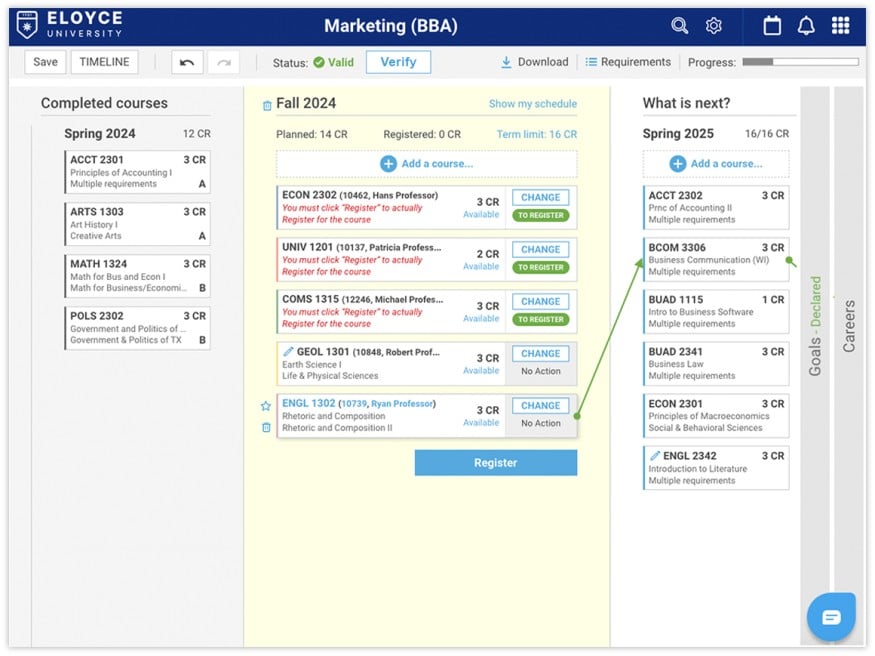Rosenda Minella has seen students change course schedules for all kinds of reasons, ranging from a class conflicting with work to a complete switch of majors.
While she has used various tools for schedule creation, often the plans became “almost immediately outdated by the time they walked out of our office,” said Minella, associate vice president of enrollment management and student success at Central New Mexico Community College.
“They change their mind or degree entirely,” she said. “Or it was an issue of say, they wanted evening classes, so chose that, but went to their bosses and found out they could only take time off during the business day.”
Now institutions are turning toward technology enhanced with artificial intelligence (AI) to navigate the turbulent world of class planning, trying tools that piece together student schedules with directions about majors and desired classes only on certain days and times.
The technology advances come amid a perfect storm of increased workload for academic advisers, said Kyle Ross, executive director of NACADA: The Global Community for Academic Advising. Contributing factors in recent years include the rise in online courses, an increasingly diverse student population and more curriculum options than ever.
“If AI can help complement that workload and free up advisers to talk through things like career exploration, navigating four-year plans, alternative credentials … we’re definitely on board with that,” Ross said.
Central New Mexico Community College began deploying a “Smart Plan” technology tool in 2019, joining a slate of institutions including Texas A&M University at San Antonio, Hillsborough Community College and, most recently Purdue University, which unveiled a partnership with technology company Ellucian in late May.
“The fact that it will plan out my four years at Purdue based off my plan of study and what I had come in with from high school is really neat when you’ll take over 40 courses at Purdue,” Kyle Emgenbroich, a junior at Purdue, said in the university statement.
Smart Plan helps students by mapping out what courses they need to take, and when, based on their declared major. For example, if a sophomore wants to be a psychology major, the tool fleshes out what courses the student needs to take and when. If that student adds a minor in political science, it updates the courses needed.

Smart Plan aims to help students know and streamline course options for a smoother registration process.
The tool also uses AI to flag students about possible options and achievements, calling out, for example, that a student may be only three extra courses away from a psychology minor. The tool also addresses the needs of multiple types of students, including those who have children, are in work study programs or attend college full time.
“Advisers really want to advise; they’re not course schedulers,” said Nandini Khedkar, director of corporate strategy at Ellucian. “We have, almost universally, heard in advising sessions they spend a disproportionate amount of time working through schedules and not much time working through all the topics they want to.”
Other companies have planted a flag in the advising field. The College Guidance Network offers AVA, an AI counseling chatbot to answer families’ questions on the college-planning process. There’s also Ivy, an AI counselor created in consultation with admissions officers by CollegeVine, an educational consulting and technology company.
The University of Michigan is building out an internal tool to help with scheduling, dubbed the “Atlas Schedule Builder.” Officials told Inside Higher Ed that, as of April, the university is still piloting the project.
“Modernizing the course selection experience was both a massive undertaking and one that we heard as a consistent need from students, advisers and administrators,” Ben Hayward, director of software development at user experience design at the University of Michigan’s Center for Academic Innovation, said in a university statement.
For many institutions, using AI- and tech-scheduling tools helps ensure students graduate in a timely manner. In the case of Ellucian’s Smart Plan, the tool’s data also helps administrators see which courses are more popular than others for long-term planning.
Minella said the tool was initially greeted with hesitation.
“Any time you introduce change, it’s always going to have mixed results,” she said. “But any time we implement a new system, we focus on how we can focus less on the mechanics of the student journey and more on how to enhance the student experience.”
Ellucian’s Khedkar emphasized that Smart Plan isn’t meant to replace advisers and, instead, streamlines rote tasks so advisers can spend more time with students on larger topics like career planning.
“The intent is not to take away anyone’s job,” she said. “It’s to spend time with the students in the way they want to.”
Ross of NACADA said his group does not discourage using technology to help in academic advising, but he does remind advisers to ensure the human touch is kept with course scheduling or other AI-completed tasks.
“Students should be engaging in meaningful conversations with their academic adviser regularly, but they can have constraints on it; some institutions have caseloads that are very high,” he said. “But just for course scheduling, a check-in is always welcome.”

